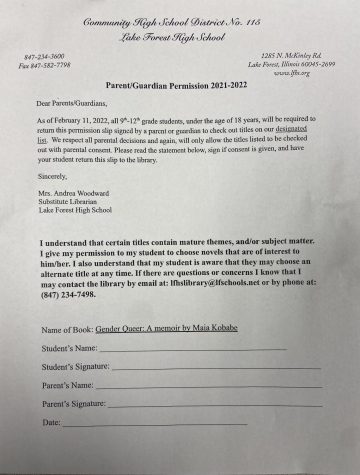Age restriction placed on ‘Gender Queer: A memoir’ in school library
Students under 18 need a parent’s permission to check out “Gender Queer: A memoir”
February 25, 2022
After complaints about the graphic novel, Gender Queer: A Memoir, Principal Dr. Erin Lenart announced last Friday that the text will remain in the school library’s general collection, but “due to graphic images and illustrations of sexual penetration,” students under the age of 18 will need formal permission from a parent or guardian to check it out.
Concerns from community members about Gender Queer: A Memoir first surfaced in October. In response, Lenart created an official Book Reconsideration Procedure that required a formal request challenging the text. This request was then considered by a committee made up of students, staff, and adult community members who read the book and submitted their recommendations to Lenart who made the final decision.
Lenart provided a link to the decision letter that was sent to the member of the community who filed the request. If they are unsatisfied with Lenart’s decision, they can appeal the decision to Superintendent Dr. Matthew Montgomery.
In the letter, Lenart outlines the recommendations of the committee.
“While the committee realizes the book does contain sensitive and mature topics, the consensus was that the author presents these topics to help the reader most clearly understand the author’s journey toward the author’s personal gender identity,” the letter states.
It also states that the committee agreed that Gender Queer: A Memoir could serve as a resource for members of the LGBTQ+ community and students struggling with gender identity or sexuality.
Additionally, the committee concluded that in addition to the book being age appropriate for students at the High School, it contains information, text, and images that are “easily found and readily available in other media” and that it is “culturally timely and relevant.”
However, Lenart decided to put an age requirement in place.
“The vast, vast majority of the advisory committee believed that Gender Queer was age appropriate, but the overarching theme of explicit, and sometimes unnecessarily so, images was present in responses,” Lenart said. “Though these images are pertinent to the story line and the evolution of eir, after my personal review, I really believe that sexual penetration should not be checked out and taken home, and therefore able to be viewed by anyone in the household, unless a parent gives consent.”

Several students are concerned about this decision.
“I think that [placing an age restriction] creates a harmful environment in the school surrounding LGBTQ+ issues,” junior Kate Johnson said. “It makes it seem as though gender expression and sexuality are issues reserved for ‘adults,’ while there are many students at the school who identify with the LGBTQ+ community.”
Johnson said the administration is being inconsistent with their support of the LGBTQ+ community when they claim to welcome groups like LFHS Alliance.
“The restriction makes you wonder if the administration actually supports the LGBTQ+ community,” she said.
Senior Christina Carris, however, said she thinks that this decision does not necessarily undermine the administration’s support of the LGBTQ+ community.
“We should have more LGBTQ+ books in our library and make those available to all students,” Carris said. “And I believe that if we brought LGBTQ+ books to Dr. Lenart and asked to place them in our library, my best guess is she would say yes.”
Carris also said she “understands where Dr. Lenart is coming from” because of the pressure Lenart is receiving from parents, but books can act as a great resource for those who are struggling with their sexual orientation or gender identity.
“If you don’t want to read the book, don’t check it out. But, don’t take away that resource from other students,” Carris said.
She also said the standard placed on Gender Queer should be upheld across all the books in the collection that have sexual images.
Lenart said that she did a cursory scan for consistency with the policy and they believe there is only one other book depicting sexual penetration–Saga by Brian K. Vaughan. Saga is also in graphic novel format, which Lenart said is growing in popularity. Now, it also needs parent permission to check out.
“If there are others that come up, we will look at those–but if there is not sexual penetration, they would have to go through the Book Reconsideration Procedure,” Lenart said.
Community member Andrea Baldi was one of the parents who said she was in favor of the removal of Gender Queer: A memoir from the school library. She originally contacted the school with concerns about the book on October 5th.
At a District 115 Board of Education meeting earlier this month, she said that the inappropriate “hypersexual” content in the book is “traumatizing.”
“What this traumatization does is makes it easier for these kids to be vulnerable to abuse, pedophilia, being promiscuous,” Baldi said during the meeting.
 There has been a rise in book challenges across the country. In October, The American Library Association’s Office for Intellectual Freedom reported a 60% increase in book challenges last year.
There has been a rise in book challenges across the country. In October, The American Library Association’s Office for Intellectual Freedom reported a 60% increase in book challenges last year.
Gender Queer: A memoir by Maia Kobabe has been one of the books at the center of the national controversy, being removed in several school districts across the country including Hudson District, Texas; Fairfax County, Virginia; Anchorage School District, Alaska.
Beyond this specific title, a bill was introduced in the Oklahoma State Senate that seeks to prohibit schools from including books that address gender identity, sexual identity, and sexual preferences in their collection.
In McMinn County, Tennessee, the Pulitzer Prize-winning Holocaust graphic novel “Maus” was removed from the 8th-grade curriculum on the basis of nudity and “foul language.”
Librarians have historically worked to resist censorship of books. In November 2021, in response to the uptick in book challenges and removals, the American Library Association issued a statement that condemns acts of censorship.
“Libraries manifest the promises of the First Amendment by making available the widest possible range of viewpoints, opinions, and ideas, so that every person has the opportunity to freely read and consider information and ideas, regardless of their content or the viewpoint of the author,” it states. “This requires the professional expertise of librarians who work in partnership with their communities to curate collections that serve the information needs of all their users.”
Eric Bailey, the Library Director of the Lake Bluff Public Library (LBPL), said that as a “non-political service branch of local government,” the library would “not comment on discussions or decisions at other libraries.”
He also said that the differing goals of a school library and public library makes it difficult to compare policies and practices.
However, he provided LBPL’s collection development policy, which outlines the selection and discussion guidelines of materials at the Library.
“The Library affirms and upholds the principles established in the Freedom to Read and Freedom to View statements and the American Library Association’s Library Bill of Rights,” the policy states. “The selection of new materials cannot be restricted because of the possibility that someone may find a title or topic objectionable. Similarly, an individual’s right to access the materials in the Library collection cannot be restricted or revoked because of another person’s definition of suitability.”
Bailey also said that unrestricted access to information is essential to achieve the goals of the LBPL.
“Open and confidential access to information and materials allows the Lake Bluff Public Library to fulfill its mission as a community information hub and neutral host for discussions on critical issues in the Village, State and country,” Bailey said.
Junior Fox Duelli said there are many students in the LGBTQ+ community who search for support within their school because their families cannot provide it.
“It seems counterintuitive to require the approval of a family member in order to check out the book, especially if the student’s family is one that is not supportive of their identity,” Duelli said. “I believe the administration is making a mistake in limiting the resources provided to teenagers questioning their identity because high school can be some of the most formative years of their life.”









Donna Taylor • Apr 7, 2022 at 7:29 pm
Dr Suess is removed.
You have to be 18 years old to buy Gender Queer.
I wrote more notes & signed her name that were always accepted. Alot of kids will read it solely for the sexually context. And their parents will never know.
I imagine the kids really love you guys.